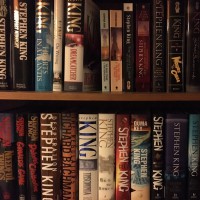“Good people shine brighter in dark times”
In keeping with a small, new theme for King, Fairy Tale presents a first-time writer. Not a hitman, though. This story starts, this writer decides after some initial hesitation, with a new bridge and the death of his mother in a small town. With a father turning to alcohol in his grief, little Charlie has to grow up quickly. King captures it all in a first-person narrative that rings as true as pretty much everything he writes. But there’s also a miracle. At least, Charlie decides that it’s a miracle, and now he has a promise to keep. To God, no less.
I’m not sure how many recovering alcoholics King has written about by now, and here it may be a minor theme, but it’s clear that AA, their sayings and their approach, mean a lot to him. Anyway, a chance to pay back comes in the form of a grouchy local in need of help. This passage reminds me of Mr Harrigan’s Phone but the direction of this story is something else entirely. Mr Bowditch is a recluse with a bad temper and an old but loveable dog. When he ends up in a hospital he has to trust Andy with a secret that turns out to be bigger than just a secret fortune in gold.
King patiently builds up their friendship with little fanfare but some genuinely touching moments along with some funny ones. Mundane tasks associated with age and illness mixed with mysteries. And at a certain point, after the old man inevitably passes away, the comparatively commonplace gives way to something else. The narrator even announces it clearly.
“This is where your disbelief begins.”
Spoiler alert: There is a well and a world at the bottom of it. This world is the source of Bowditch’s wealth but also a great responsibility for its new owner. There is an old city which seems deserted but isn’t. There are dangers. And the greatest danger may be that the wrong people in our world find out about it. Reminds me of a novel I wrote once. On the other hand, that novel owes a great deal to The Talisman.
References to classic fairytales are plentiful and hardly subtle when the curtain opens, so to speak, and the book’s theme is laid bare. The people he meets first in the world of Empis seem nice enough but cursed, gray-skinned and being slowly distorted. There is even a princess, it seems, silenced by some evil power in the cruellest way. He can speak to them but more modern words simply can’t be uttered. It’s not forbidden, it’s just that:
“Info wouldn’t come out.”
The remnants of a royal family, whom he meets one by one on his journey, give him more information about what has happened to Empis. The chief goal of said journey, by the way, is to save the dog from old age with the help of a sundial.
I’m not thrilled about the explicit references to fairytales or more modern tales like The Never Ending Story. That sort of thing usually works better when inferred. But King’s world gradually takes on its own shape. There are plenty of characters to introduce. The deaf and thus loud Claudia is an instant favourite. The long trek to and through a not-quite deserted city offers foreboding and a clingy atmosphere of dread, not quite ruined by the almost cartoonish giant at the centre. This sequence becomes increasingly thrilling in a horrific kind of way and you could almost say that this is where the story comes into its own. It’s reminiscent of The Waste Lands (the third Dark Tower instalment) in some ways, but more in tone than story.
A hopeless situation allows King to relish in colourful misery. And there is an encounter with an evil but polite character which, again, reminds me of something I wrote once. And here too, rich information about the world is provided by fellow prisoners. Cliches abound generously – gladiator-like games, a secret prince – but now there is a confidence and drive to the story which I didn’t always find at the beginning.
Prince he may be, but Charlie does not view himself as particularly noble (less so than the reader is apt to) and draws in the darkness inside him when the situation becomes vicious enough to require it.
This is not a Dark Tower tie-in, even with lines like “there are other words than these”, but the mood is often similar, especially in the darkest (no pun intended) parts. In place of a tower, there is a Dark well and its purpose is pretty much the opposite. This is, as the title says, a fairytale, and after a start which I at times found less than enchanting, it becomes quite a thrilling one. Before the end, King even has time to include som rather Lovecraftian elements to cap an imperfect but colourful story.
Written during Covid’s reign, a story to make the writer happy, it’s no surprise that Fairy Tale is absolute escapism. Come to think of it, those years are already starting to feel a little unreal to me.
